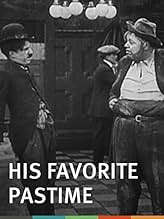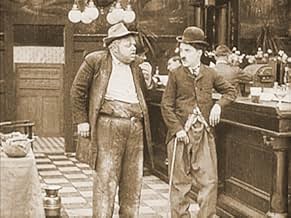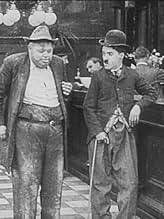NOTE IMDb
4,9/10
1,3 k
MA NOTE
Ajouter une intrigue dans votre langueA very plastered fella follows a pretty woman home, and proceeds to make a nuisance of himself.A very plastered fella follows a pretty woman home, and proceeds to make a nuisance of himself.A very plastered fella follows a pretty woman home, and proceeds to make a nuisance of himself.
- Réalisation
- Scénario
- Casting principal
Peggy Pearce
- Wife
- (as Velma Pearce)
Helen Carruthers
- Servant
- (non crédité)
Jess Dandy
- Minor Role
- (non crédité)
Hampton Del Ruth
- Drinker with Moustache
- (non crédité)
Billy Gilbert
- Shoeshine Boy
- (non crédité)
William Hauber
- Shoeshine Customer
- (non crédité)
- …
George Jeske
- Servant
- (non crédité)
Edgar Kennedy
- Tough Guy in Bar
- (non crédité)
Harry McCoy
- Bar Patron
- (non crédité)
Rube Miller
- Bar Patron
- (non crédité)
Avis à la une
Although Charles Chaplin played the alcoholic convincingly and there were a couple of funny and clever moments (when the drunkard falls over the railing, lands on the couch and so very elegantly lights his cigarette), 'His Favorite Pastime' wasn't my favorite at all. There are loveable drunkards and then there are those annoying creepy ones. Chaplin, unfortunately, managed to be the latter one. I never felt sympathy towards his character and was waiting when he gets the proper beating as the bully deserved. This is actually quite a pity because 'His Favorite Pastime' is one of the best structured and logical of the early Chaplin's movies. 'Fatty' Arbuckle's appearance at the beginning was quite joyous though.
In another disappointing short comedy, Charlie Chaplin once again plays the standard, belligerent drunk, drinking himself into oblivion and then stumbling around this run-of-the-mill slapstick comedy. There are some mildly interesting items, such as the fact that the altogether unamusing but watchable opening scene features Chaplin and Keystone colleague Fatty Arbuckle as fellow drinkers in the pub, taking beers away from each other and gradually getting drunker and drunker, as well as the fact that this is one of the earliest, maybe even the origin, of one of Chaplin's gags that he would later perfect and use with great success, the lighting of the match on the seat of his pants. Other than that, there is not much else of note here.
The comedy of the film is really nonexistent, which is not to say that it is entirely bad, just a failed experiment. The obnoxious drunk has long since lost its appeal, if it ever had any, and I imagine even audiences back in 1914 must have been getting tired of it. The film features some of the most blatant racism of any of his films, although certainly not the last (remember the three minds with but a single thought from A Day's Pleasure?). At one point late in the film, Charlie follows a woman right into her home and hits on her, and is then horrified when he realizes that she is black. He also drops a lighted match into a black man's hand when he holds it out for a tip, which is exactly the kind of thing that makes this drunken character so dislikable.
Most of the rest of the film is composed of people pushing and shoving other people around and hitting each other, and ultimately it seems that Chaplin simply uses drunkenness in the film to serve as a reason to stagger around and hit people and get in fights with swinging doors and fall over stairway banisters and such. The plot outline on the IMDb says "A very plastered fella follows a pretty woman home, and proceeds to make a nuisance of himself." And sadly, there's not much difference between watching the film and reading that one line.
The comedy of the film is really nonexistent, which is not to say that it is entirely bad, just a failed experiment. The obnoxious drunk has long since lost its appeal, if it ever had any, and I imagine even audiences back in 1914 must have been getting tired of it. The film features some of the most blatant racism of any of his films, although certainly not the last (remember the three minds with but a single thought from A Day's Pleasure?). At one point late in the film, Charlie follows a woman right into her home and hits on her, and is then horrified when he realizes that she is black. He also drops a lighted match into a black man's hand when he holds it out for a tip, which is exactly the kind of thing that makes this drunken character so dislikable.
Most of the rest of the film is composed of people pushing and shoving other people around and hitting each other, and ultimately it seems that Chaplin simply uses drunkenness in the film to serve as a reason to stagger around and hit people and get in fights with swinging doors and fall over stairway banisters and such. The plot outline on the IMDb says "A very plastered fella follows a pretty woman home, and proceeds to make a nuisance of himself." And sadly, there's not much difference between watching the film and reading that one line.
His Favorite Pastime (1914)
* 1/2 (out of 4)
Charles Chaplin plays the town drunk who walks into a local bar and starts throwing them down. Soon he can't walk straight but that doesn't stop him from getting on everyone's nerves. The annoying drunk had been done to death by 1914 and it had been done to death by Chaplin even though this was only his seventh movie. I'm really not sure what Chaplin thought of these films but this one here is pretty darn weak from start to finish with very few laughs. Once again we get to see Chaplin stumble around, pick fights and flirt with women who belong to other men. None of this is funny and what's worse is that it appears Chaplin is just sleepwalking through the film. You certainly can't blame here because I didn't see a single attempt at anything even trying to be funny. Roscoe 'Fatty' Arbuckle has a small role at the start of the film but just stumbles around as another drunk. Even if laughs could come from drunks, this one here features rather mean drunks, which again just isn't funny.
* 1/2 (out of 4)
Charles Chaplin plays the town drunk who walks into a local bar and starts throwing them down. Soon he can't walk straight but that doesn't stop him from getting on everyone's nerves. The annoying drunk had been done to death by 1914 and it had been done to death by Chaplin even though this was only his seventh movie. I'm really not sure what Chaplin thought of these films but this one here is pretty darn weak from start to finish with very few laughs. Once again we get to see Chaplin stumble around, pick fights and flirt with women who belong to other men. None of this is funny and what's worse is that it appears Chaplin is just sleepwalking through the film. You certainly can't blame here because I didn't see a single attempt at anything even trying to be funny. Roscoe 'Fatty' Arbuckle has a small role at the start of the film but just stumbles around as another drunk. Even if laughs could come from drunks, this one here features rather mean drunks, which again just isn't funny.
Just as Babe Ruth struck out now and then, and George Gershwin hit the occasional sour note, Charlie Chaplin made a few comedies during his apprenticeship at Keystone that don't hold up all that well. In the better efforts we can detect a great talent struggling to emerge from the chaos, and there are good moments scattered about, while a couple of them (I'm thinking of The New Janitor and Caught in a Cabaret) are quite satisfying: nicely constructed films with funny gags and a story to tell. However, several of the Keystones -- and I say this as a lifelong Chaplin fan -- are a chore to sit through. Too many of them are burdened with an overload of silly histrionics and painful-looking slapstick violence, and those good moments are hard to find.
Well, I'd say the good moments are scarce indeed in His Favorite Pastime. The main problem is that Chaplin's character is so obnoxious: he looks like the Little Tramp, but sure doesn't act like him. Most of this film is set in a pub, and once Charlie's had a few shots he turns into a mean drunk. There's a vigorous workout involving a swinging door, and it's mildly amusing, but the routine lacks the finesse Chaplin would bring to such business later on, in far better comedies such as The Cure. Moreover, in his later work the characters taking the brunt of the violence usually deserved it. Here, by contrast, when an inoffensive washroom attendant (a white actor wearing black-face makeup) holds out his hand for a tip, Charlie drops a lighted match instead of a coin and burns the man's hand. Ouch! Later, thoroughly blotto, Charlie follows a pretty woman home, walks right into her house, and makes a pass at her. Actually, on his first attempt, he accidentally makes the pass at her 'colored' maid (again a white performer in black-face), and is horrified when he realizes his mistake -- a very unusual racial gag in Chaplin's work, and another strike against this film. Really the only worthwhile moment is a nice demonstration of physical dexterity, when Charlie falls over a banister, lands on a sofa, and then casually lights a cigarette.
There are a couple points of minor interest in His Favorite Pastime concerning the cast: the opening sequence in the saloon features Chaplin's Keystone colleague Roscoe Arbuckle, so heavily disguised as a shabby drunk that he's barely recognizable. Where laughs are concerned nothing much comes of the scene, but it's interesting to note Arbuckle's resemblance to Orson Welles in his grizzled makeup for A Touch of Evil, made many years later. Also, the society lady Charlie follows home is played by an actress variously known as Peggy Pearce and Viola Barry, who reportedly was romantically involved with Chaplin for a brief time during his stint at Keystone. Here she isn't given much to do, but she can be seen to better advantage opposite Lillian Gish in D. W. Griffith's Biograph drama of 1913, The Mothering Heart. That short drama, by the way, holds up considerably better than this comedy.
Well, I'd say the good moments are scarce indeed in His Favorite Pastime. The main problem is that Chaplin's character is so obnoxious: he looks like the Little Tramp, but sure doesn't act like him. Most of this film is set in a pub, and once Charlie's had a few shots he turns into a mean drunk. There's a vigorous workout involving a swinging door, and it's mildly amusing, but the routine lacks the finesse Chaplin would bring to such business later on, in far better comedies such as The Cure. Moreover, in his later work the characters taking the brunt of the violence usually deserved it. Here, by contrast, when an inoffensive washroom attendant (a white actor wearing black-face makeup) holds out his hand for a tip, Charlie drops a lighted match instead of a coin and burns the man's hand. Ouch! Later, thoroughly blotto, Charlie follows a pretty woman home, walks right into her house, and makes a pass at her. Actually, on his first attempt, he accidentally makes the pass at her 'colored' maid (again a white performer in black-face), and is horrified when he realizes his mistake -- a very unusual racial gag in Chaplin's work, and another strike against this film. Really the only worthwhile moment is a nice demonstration of physical dexterity, when Charlie falls over a banister, lands on a sofa, and then casually lights a cigarette.
There are a couple points of minor interest in His Favorite Pastime concerning the cast: the opening sequence in the saloon features Chaplin's Keystone colleague Roscoe Arbuckle, so heavily disguised as a shabby drunk that he's barely recognizable. Where laughs are concerned nothing much comes of the scene, but it's interesting to note Arbuckle's resemblance to Orson Welles in his grizzled makeup for A Touch of Evil, made many years later. Also, the society lady Charlie follows home is played by an actress variously known as Peggy Pearce and Viola Barry, who reportedly was romantically involved with Chaplin for a brief time during his stint at Keystone. Here she isn't given much to do, but she can be seen to better advantage opposite Lillian Gish in D. W. Griffith's Biograph drama of 1913, The Mothering Heart. That short drama, by the way, holds up considerably better than this comedy.
7tavm
This Charlie Chaplin short was the first I watched on the 2 DVD collection of his courtesy of the Platinum Disc Corporation. In this one, he's the familiar Tramp character who's drunk the whole time so anything he does here is the result of his inebriation. As a result, I actually found most of it funny especially early on when one of the people he encounters is fellow comic Roscoe "Fatty" Arbuckle as a fellow bar patron who tries to get his drink without Chaplin looking. Since Arbuckle wasn't yet a star, that's all we see of him though he makes a good impression here. Most of the time, it's just Charlie as he stumbles through missing punches or getting punched, going into someone's house and getting the residents' reactions, or scaring some dark-skinned servants (obviously caricatured by Caucasian humans though not as offensively portrayed since there's no white lips or other stereotypical characteristics). Quite funny for an early effort so on that note, I recommend His Favorite Pastime.
Le saviez-vous
- AnecdotesThis film is among the 34 short films included in the "Chaplin at Keystone" DVD collection.
Meilleurs choix
Connectez-vous pour évaluer et suivre la liste de favoris afin de recevoir des recommandations personnalisées
Détails
- Date de sortie
- Pays d’origine
- Sites officiels
- Langues
- Aussi connu sous le nom de
- Charlie Is Thirsty
- Société de production
- Voir plus de crédits d'entreprise sur IMDbPro
- Durée
- 16min
- Couleur
- Mixage
- Rapport de forme
- 1.33 : 1
Contribuer à cette page
Suggérer une modification ou ajouter du contenu manquant




























